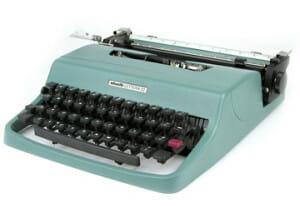Today’s New York Times carried an interesting story about the author Cormac McCarthy and his decision to sell his trusty typewriter, an Olivetti Lettera 32. Here’s how Wikipedia cited the Times story:
Cormac McCarthy used an Olivetti Lettera 32 to write nearly all of his fiction, screenplays, and correspondence over a fifty year period from 1960 to 2009. In 2009 the typewriter was auctioned by Christies to benefit the Santa Fe Institute. McCarthy paid $11 for a replacement typewriter of the same model, but in newer condition.
And here’s how the Times characterized McCarthy’s output on the Olivetti:
Mr. McCarthy, 76, has won a wagon-full of honors including a Pulitzer Prize, a National Book Award and the MacArthur Foundation’s so-called genius grant. Books like “Blood Meridian,” “All the Pretty Horses” and “The Crossing” have propelled him to the top ranks of American fiction writers.
Note that McCarthy estimates he typed about 5 million words on the Olivetti, and bought it originally when he was headed overseas and wanted a light machine. Since Olivetti specially designed this typewriter for travelers and correspondents, it was ideal.
In fact, the Olivetti was the laptop of its day. It came in a neat zip-up case with a handle to make carrying it easy. And, as it happens, it’s exactly the same typewriter I’ve owned for 30 years, and on which I wrote the first drafts of Body Types. Okay, it’s not quite the same as No Country for Old Men, but still.
From experience I can tell you that this little Olivetti typewriter actually took a fair amount of banging to get through a page. I don’t want to go back to the days of erasable paper, white out, and carbon copies. But sometimes I miss the visceral relation to the writing machine, the physical force it took to drive the keys, through their levers, to hit the page.
I could always tell when I’d been writing something that made me angry, or passionate, because the letters would almost punch through the sheet.
Today, at a Starbucks Near You
Turn your attention to the local Starbucks. Perhaps you are an author, working on a rewrite on your manuscript. You’ve got your trusty iBook, a big cup of coffee, and you’re ready to work. You wait to connect to the WiFi signal, and glance around. The girl at the next table has a new MacBook Pro. You know it’s twice as fast as your old laptop, has a bigger screen, runs all the new software.
You look at your old machine a bit wistfully. It takes a while to load your browser, it won’t run the newest games or image editing software, and it “hiccups” once in a while if you’ve got too many programs running at once. You start to think just how productive you could be if only you had one of those MacBooks.
Isn’t that a good reason to get out the Visa card? I mean, it will help you with your work, right?
Stop, in the Name of Work
It’s easy to get fixated on the tools we use to do our work as authors and publishers. What’s becoming steadily more difficult is staying focused on the tasks in front of us. The story of Cormac McCarthy’s typewriter is a story pared down to its essentials. A man, an instrument that helps him write. Period. There is no email, no browser, no games, no blogs, no tweets, no status updates.
I have a picture in my mind of sitting at the little table I worked on in our apartment in New York, and McCarthy at the same time banging away on his Olivetti. Just the writer, alone, and the blank page. Have we lost something from that time, something that would make our work better today?
We have to remember where the path is that leads to the goals we’ve set for ourselves. Often, these goals are easier to reach when we learn to filter out the distractions and concentrate on the task at hand.
A Suggestion
Although we need our computers to do our work, I have a suggestion: When you are writing, close all your other programs and just write. With nothing else going on, you are free to concentrate on one thing. Single-task instead of multi-tasking. Set this time aside for writing and nothing else. I’m betting you’ll get a lot more done.
Do you have a typewriter on which you started your writing journey? I’d love to hear about it.



